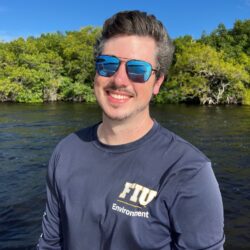Students and faculty from Royal Palm Beach Community High School spent an informative and fun day conducting research in the Lake Worth Lagoon with Florida International University scientists.
EXPEDITION DETAILS
March 15, 2025
Palm Beach County, FL
Gina Badlowski
Mia Gabb
Sophia Hemsi
William Sample
Veronica Zuccolo
All sharks were fished for, caught, studied and released for research purposes under Florida permits held by Florida International University scientists.
A team of keen students and educators from Royal Palm Beach Community High School boarded R/V ANGARI for a Coastal Ocean Explorers: Sharks expedition in partnership with scientists from Florida International University’s College of Arts, Sciences and Education. Within the Lake Worth Lagoon, the group took part in deploying and recovering drumlines, specialized fishing gear for shark research. They also deployed baited remote underwater video systems (BRUVS) to capture underwater footage of local marine species.
Over the course of the day, students and scientists deployed two baited remote underwater video systems (BRUVS): one south of Palm Beach Inlet and one near Blue Heron Bridge. The first BRUVS survey recorded footage of both a nurse shark (Ginglymostoma cirratum) and a bull shark (Carcharhinus leucas). This was only the second time that BRUVS footage of a bull shark had been captured on a Coastal Ocean Explorers: Sharks expedition! The second BRUVS recorded footage of multiple species of fish, including a filefish. The two BRUVS surveys allowed students to gain a better understanding of the diversity of life within the Lake Worth Lagoon.
Much of the expedition was spent deploying drumlines to fish for sharks. Participants deployed 16 drumlines north of Blue Heron Bridge and caught three nurse sharks! The first shark was the smallest at 6.0 ft, and the second shark was the largest at 8.6 ft. After scientists secured each shark to the stern of R/V ANGARI, students worked collaboratively alongside the scientists to workup the sharks. They measured the precaudal length (PCL) and stretched total length (STL), took fin clip tissue samples and tagged sharks with National Oceanic and Atmospheric Administration Cooperative Shark Tagging Program (NOAA CSTP) identification tags. It was a great day of research for Royal Palm Beach Community High School.
This expedition was supported by the generous donors of ANGARI Foundation.
CHIEF SCIENTIST

Will Sample is a Ph.D. candidate in the Marine Community and Behavioral Ecology Lab at Florida International University. His current research uses both long-term historical datasets and newer methods, such as high-resolution accelerometry, to study the movement and behavioral ecology of juvenile bull sharks. He specifically focuses on the way these sharks may be transporting nutrients across habitat boundaries, how they may be optimizing their movements to save energy and what the long-term implications of different behaviors they specialize in may be. Will’s research in the Florida Everglades studying the ways sharks move through this crucial ecosystem is important for conservation and informing habitat restoration and management efforts. Will earned a B.S. in Liberal Arts and Sciences from Florida Atlantic University in 2018 and has lived all throughout Florida for most of his life, from Jacksonville to Jupiter to the Keys. He is passionate about community outreach and education, particularly regarding Florida’s natural habitats, and currently serves as lead scientist for ANGARI’s Palm Beach County based Coastal Ocean Explorers: Sharks program aboard R/V ANGARI.


